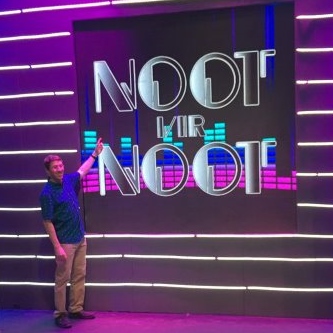
News

Jewish mentalist proves you don’t have to be Afrikaans to win
TALI FEINBERG
“It’s huge to win, especially for an English-speaking person. It’s probably the longest-running game show on South African TV, as this was its 44th season. I think it started in the ‘70s or ‘80s, just after TV came to South Africa. It has a massive following around the country, in the Afrikaans- speaking community and other communities,” says Abrahamson.
He has been on the show before. He reached the semi-final in the year 2000, and has been trying to compete again ever since. He was finally given the chance to return, and knew he was in it to win it.
Abrahamson was one of only 36 people out of thousands to qualify in the auditions. “It’s basically a 1% chance, so the odds are astronomical from the word go. English speakers are also at a huge disadvantage as it’s all in Afrikaans and based on Afrikaans music from a database of 20 000 songs,” says Abrahamson.
“You have to translate the question in your head, and answer it before the other competitor who is on top of their game.” He also had to answer in Afrikaans, unless the answer was a word, name, or phrase in English.
Abrahamson won the title and a monetary prize, but for him it was about “the yichus [bragging rights] of winning this at astronomical odds. The money was immaterial. It was about taking an opportunity and grabbing it, especially after trying to get on the show for so long.”
So, how does one prepare to win? “You listen to as much music as possible, but at the end of the day, you know what you know. It’s about being able to recall something under a huge amount of pressure – like hearing two notes of a song and being able to identify it,” says Abrahamson.
In fact, that’s what led him to win. “Those last moments were tense. I was way ahead of my competition until the last round when my rival caught up. We had to identify two notes of an Afrikaans song, I knew it, pressed the buzzer and won. It was a huge relief and hasn’t properly sunk in yet!”
Filming the show is a huge commitment – each one-hour episode translates to about 12 hours a day on set, so the contestants need mental and physical stamina. Also, this season was filmed in May, so Abrahamson had to keep his win quiet until now.
Despite the fierce competition, he is good friends with his rivals on the show. They are part of a WhatsApp group with competitors from other seasons. “It’s almost like a little family,” he says.
Although Abrahamson is a public figure recognised for sports commentary and a mentalist world record, he is being recognised even more often following the win. One could say that he is famous. “The reaction among Jewish community has also been amazing – everyone is excited. Even in shul on Friday night, my rabbi spoke about it for 10 minutes!”
When not winning game shows, Abrahamson is a professional mentalist, motivational speaker and sports commentator. He hosts Powerbrain workshops for schoolchildren and students on how to use the brain effectively. “In the show, I used the skills I teach on staying calm and turning the brain on and off,” he says.
He often enters other game shows and quizzes. Next year, he hopes to break a world record he set on Mathematical Pi Day on 14 March when, under the supervision of four watchful judges, his goal was to recall as many digits of Pi as possible in five minutes. Exceeding his own expectation and breaking the South African record, he recalled the first 1 500 digits in an astonishing time of four minutes, seven seconds – 53 seconds faster than his target and without a single error, and all while blindfolded. He hopes to beat this record on 14 March next year.




